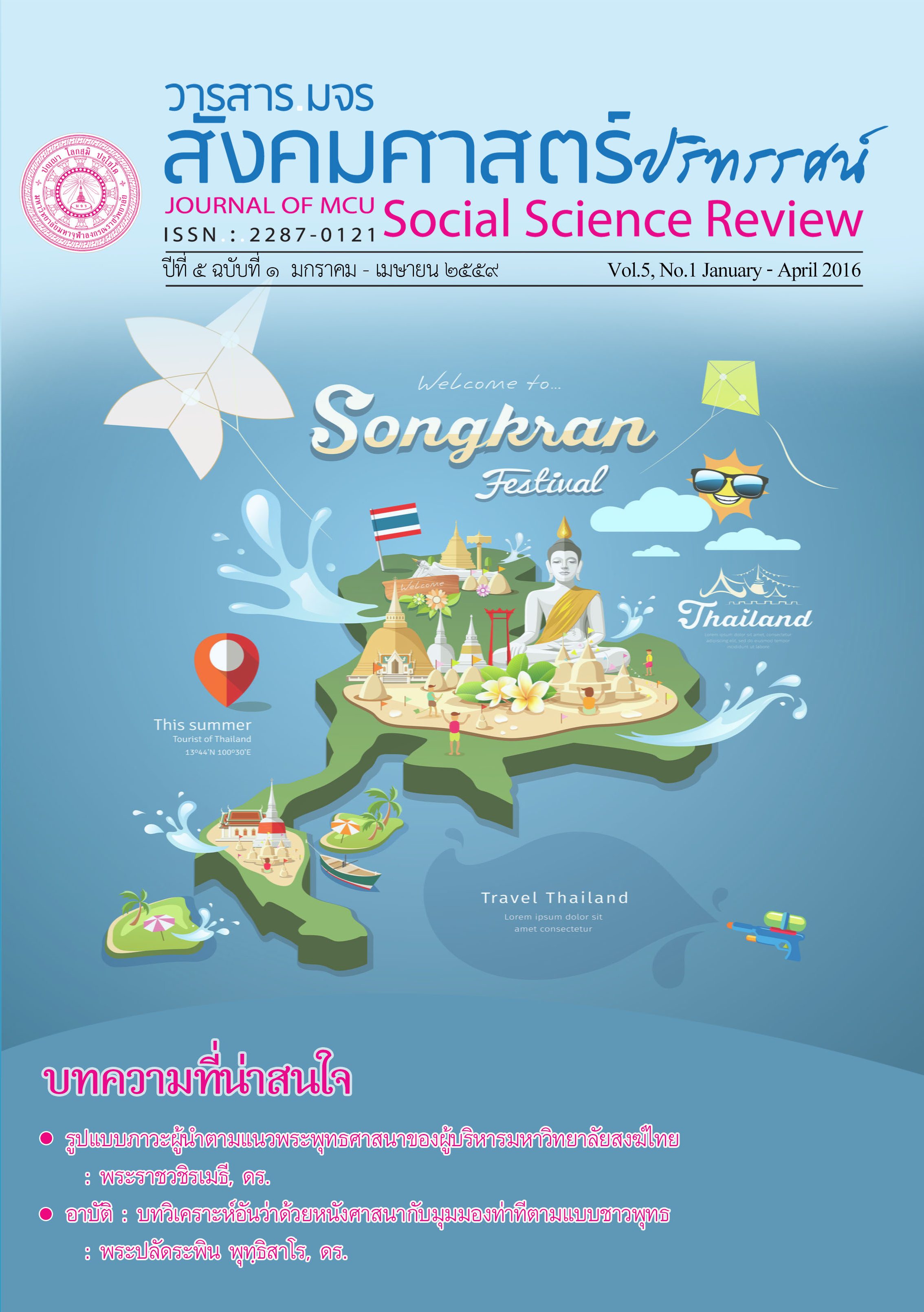พุทธบูรณาการการพัฒนาทุนมนุษย์สู่ความเป็นองค์กรสมรรถนะสูง ของสถาบันการศึกษาระดับอุดมศึกษาของคณะสงฆ์ไทย
คำสำคัญ:
พุทธบูรณาการ, องค์กรสมรรถนะสูงบทคัดย่อ
บทความวิจัยนี้ มีวัตถุประสงค์เพื่อ ๑) เพื่อศึกษาสภาพทั่วไปของการพัฒนาทุนมนุษย์ในสถาบันการศึกษาระดับอุตมศึษาของคณะสงฆ์ไทย ๒) เพื่อศึกษาแนวคิด และทฤษฎีที่เกี่ยวข้องกับการพัฒนาทุนมนุษย์ตามหลักทั่วไป ๓) เพื่อศึกษาการพัฒนาทุนมนุษย์ตามหลักพระพุทธศาสนา๔) เพื่พุทธบูรณากรกรพัฒนาทุนมนุษย์สู่ความป็นองค์กรสมรรถนะสูงของสถาบันการศึกษาระดันอุดมศึกษาของคณะสงฆ์ไทยระเบียบวิธีวิจัยเป็นแบบผสานวิธี ระหว่างวิธีวิจัยเชิงประมาณและวิธีวิจัยเชิงคุณภาพวิธีการวิจัยเชิงปริมาณ และให้ความสำคัญวิธีการวิจัยเชิงคุณภาพ เป็นหลักโดยใช้การวิจัยเชิงปริมาณ ซึ่งมีแบบสอบถาม กลุ่มตัวอย่างที่ใช้ในการวิจัยมาจากประชากรจำนวน ๑,๗๘๓ รูปหรือคนเทศนิคและวิธีการสุมตัวอย่างการทำวิจัยเรื่องนี้ ผู้วิจัยได้คำนวณขนาตของกลุ่มตัวอย่างตามสูตรของทาโร่ ยามาเน่ (Ta Yamane)ให้กับกลุ่มตัวอย่างที่เป็นผู้บริหาร บุคลากรสายวิชาการ และบุคลากรสายปฏิบัติกา ของมหาวิทยาลัยมหาจุฬาลกรณราชวิทยาลัย ทั้งส่วนกลาง และส่วนภูมิภาคและนำผลการวิจัยชิงปริมาณไปทำการสัมภาษณ์เชิงลึก จากผู้ให้ข้อมูลสำคัญ ที่เป็นทั้งผู้บริหาร คณาจารย์ จำนวน ๒๕ รูปหรือคนผลการวิจัยพบว่าสภาพทั่วไปของการพัฒนาทุนมนุษย์นสถาบันการศึกษาระดับอุตมศึกษาของคณะสงฆ์ไทย บุคลากของมหาวิทยาลัย มีสถานภาพเป็นบรรพชิต มากกว่าคฤหัสถ์ โดยเป็นบรรทชิตจำนวน ๒ดดรูป คิดเป็นร้อยละ ๖๗!๗๙ และเป็นคฤหัสถ์ จำนวน ดอ๕ คน คิดเป็นร้อยละ m๒.๒ดมีอายุระหว่าง ๒๐๓๐ ปีจำนวน ด๐๙ รูปหรือคน คิตเป็นร้อยสะ ต.๔๔ ระดับการศึกษาระดับปริญญาต จำนวน ๒๖ รูปหรือคน ดิตป็นร้อยละ ๓ะ.๖๕ ส่วนใหญ่เป็นบุคลากรส่วนกลางจำนวน ด๖ด รูปหรือคน คิตเป็นร้อยละ ๔๙.m เป็นเจ้าหน้าที่ จำนวน ๘๗ รูปหรือคน คิดเป็นร้อยละ ๕๗..๖ มีอายุการทำงานระหว่าง๖ด๐ ปี จำนวน ๘๙ รูปหรือคน คิตเป็นร้อยละ ๒๗.n๐รองสมามีอายุการทำงนระหว่างด-๕ ปีจำนวน ๘ครูปหรือคน คิดเป็นร้อยละ ๒๔..๘๕๒. การพัฒนาทุนมนุษย์ในสถาบันการศึกษาระดับอุดมศึกษาของคณะสงฆ์ไทยมีนโยบายที่กำหนดทิศทางการพัฒนาบุคลากรที่ชัตเจนมีการวางแผนเส้นทางความก้าวหน้าข องบลากรทุกคนแต่ยังขาดการวางแผนการพัฒนาบุคลากรที่ยังไม่ครอบคลุมทุกภาคส่วนการกำหนตอัตรากำสังบุคลากรยังไม่สอดคล้องกับภาระงานและเวลาทำงาน ตสอตถึงการสรรหาบุคลากรมีการสรรหาบุคลกรในหน่วงานที่ได้รับการพัฒนาแล้วเข้าบรรจุในตำแหน่งที่ว่าง ตลอดถึงมีการนำผลการปฏิบัติงนมาประกอบการพิจรณาความตีความชอบ แต่ยังขาตการสนับสนุนการเบิกจ่ายสวัสติการแก่บุคลากรยังไม่ทั่วถึง๓. การพัฒนาทุนมนุษย์ด้วยพุทธบูรณาการ (หลักไตรสิกขา มหาวิทยาลัยสงเสริมให้บุดสกรเกิตการประพฤติปฏิบัติตามหลักจริยธรรม และคุณธรรมส่งเสริมให้บุคลากรทำความเข้าใจในกฎ กติกการอยู่ร่วมกันเคารพสิทธิและหน้าที่ของกันและกัน และเน้นการจัดกิจกรรมเพื่อพัฒนาประสิทธิภาพในการปฏิบัติงนปลูกจิตสำคในการปฏิบัติหน้าที่มีการพัฒนาทุนมนุษย์สัมพันธ์ โตยสนัสนุนส่งเสริมให้บุคลกรเร่วมฝีกอบรมเพื่อสร้างองค์ความรู้ ส่งเสริมชำนาญและก่อให้เกิตประสบการณ์ไหม่ๆ และเพื่อพิมพูนประสิทธิภาพการทำงานโดยปราศจากการเบียดเบียนซึ่งกันและกันมีการพัฒนางานให้เป็นไปตามครรลองดสองธรรมมีการนำหลักศีสมาประยุกต์ไช้เพื่อปรับปรุงระบบการบริหารจัดการในองค์กรมีการส่งเสริมในเรื่องการศึกษาในสาขาวิชาหรือหลักสูตรสูงขึ้นมีการสนับสนุนในเรื่องทุนการศึกษาเพื่อส่งเสริมและสนับสนุนให้กับบุคลากรเล่าเรียนในระตับสู โดยให้รู้เท่ทันการเปลี่ยนแปลงในอนาคตอย่างมีประสิทธิภาพ๔. การพัฒนาทุนมนุษย์ในสถาบันการศึกษาระดับอุตมศึกษาของตณะสงฆ์ไทย ในส่วนของนโยบายการพัฒนาบุคลากรของมหาวิทยาลัยมีความเห็นที่สอตคล้องกันและสามารถตอบรับแผนการพัฒนาบุดกรของมหาวิยาลัยมหาจุฬลกรณราชวิทยาสัย ฉบับที่ ดต มียุทธศาสตร์๕ ต้าน คุมพันธกิจ ๔ ด้าน บวกเรื่องการบริหารจัดองค์กรเข้าไป ในแต่สะตานมีความเกี่ยวข้องการพัฒนาทุนมนุษย์ในแผนแล้วมีรายละเอียดเป็นตัวบ่ง ป็นโครงการ โดยเฉพาะนโยบายของมหาวิทยาลัยที่กำหนดไว้ในแผนปฏิบัติการประจำปี ส่งเสริม สนับสนุนให้บุคลากรมีการพัฒนาก้าวหนในหน้าที่มากขึ้นเรียคว่กระบวนเป็นไปตามหลักเกณฑ์ ส่งเสริมและพัฒนาทางด้านการศึกษที่ต้องการศึกษต่อทั้งสายวิชการ หรือบุคลกรทางการศึกษาโดยจัตสรรงบประมาณส่วนหนึ่งไทุกปังบประมาณถ้าบุคคลมีความรู้ความสมารถตรงตามคุณสมบัติที่มหาวิทยาลัยกำหนดไว้
เอกสารอ้างอิง
ชัญญา อภิปาลกุล. กรศึกษารูปแบบการบริหารการศึกษาสถาบันการศึกษาสงฆ์ในภาคตะวันออกเฉียงเหนือ กรณีศึกษามหาวิทยาลัยมหาจุฬาลงกรณราชวิทยาลัย,กรุงเทพมหานคร : สำนักงานคณะกรมการวัฒนธรรมแห่งชาติ, ๒๕๔๒.
ณัฏฐพัน เขจรนันทน์. การจัดการทรัพยากรบุคคล. พิมพ์ครั้งที่ ๒. กรุงเทพมหานด : โรงพิมพ์แห่งจุฬาลงกรณ์มหาวิทยาสัย, ๒๕๔๒.
นิสตารก์ วชยานนท์ มิติใหม่ในการบริหารทุนมนุษย์. กรุงเทพมหานคร : คณะรัฐศาสตร็, สถาบันบัณฑิตพัฒนบริหารศาสตร์, ๒๕๕๑.
บุญทัน ตอกไรสง. การจัดการทุนมนุษย์. กรุงเทพมหานคร : พิมพ์ตะวัน, ๒๕๕๑.องอาจ นัยพัฒน์. การออกแบบการวิจัย : วิธีการเชิงปริมาณเชิงคุณภาพและผสมผสานวิธีการ,กรุงเทพมหานคร : โรงพิมพ์มหาวิทยาสัยศรีนครินทร์วิโรฒ, ๒๕.๕ด.
(๒) วิทยานิพนธ์/รายงานวิจัย:
เกรียงไกรยศ พันธุ์ไทย. "อิทธิพลของพฤติกรรมผู้นำวัฒนธรรมการทำงานในองค์การ และกิจกรรมการพัฒนาทรัพยากรมนุษย์ที่มีต่อผลการปฏิบัติงานของพนักงานรัฐวิสาหกิจ ".
วิทยานิพนธ์ฐประศสนศสตรดุษฎีบัณฑิต, สถาบันบัณฑิตพัฒนบริหารศาสตร์,
ฌาน ตรรกวิจรณ์. "การพัฒนาทรัพยากรมนุษย์เชิงพุทธ". วิทยานิพนธ์ปรัชญาดษฎีบัณฑิตสาขาวิชรัฐประศสนศสตร์. บัณฑิตวิทยาลัย : มหาวิทยาลัยรามคำแหง, ๒๕๕o.
บุษกร วัฒนบุตร. "กรนำพุทธญาณวิทยา (ไตรสิกขา) และตัวแบบ KรM เพื่อสร้างและพัฒนาทุนมนุษย์ในองค์กรมหาชน" . วิทยานิพนธ์รัฐประศาสนศาสตรดุษฎีบัณฑิต สาขาวิชารัฐประศาสนศาสตร์. บัณติตวิทยาสัย : มหาวิทยาสัยราชภัฎวไลยอลงกรณ์
สมชา สรรประเสริฐ. "กลยุทธ์การพัฒนาทรัพยากรมนุษย์ของกองบังคับการตำรวจท่องเทียวสำนักงานตำรวจแห่งชาติ". วิทยานิพนธ์ปริญญาปรัชญาตุษฎีบัณฑิต สาขาวิชารัฐประศาสนศาสตร์. บัณฑิตวิทยาสัย : มหาวิทยาลัยรามคำแหง, ๒๕๕๒.
ดาวน์โหลด
เผยแพร่แล้ว
รูปแบบการอ้างอิง
ฉบับ
ประเภทบทความ
สัญญาอนุญาต
ลิขสิทธิ์ (c) 2016 วารสาร มจร สังคมศาสตร์ปริทรรศน์

อนุญาตภายใต้เงื่อนไข Creative Commons Attribution-NonCommercial-NoDerivatives 4.0 International License.
เพื่อให้เป็นไปตามกฎหมายลิขสิทธิ์ ผู้นิพนธ์ทุกท่านต้องลงลายมือชื่อในแบบฟอร์มใบมอบลิขสิทธิ์บทความให้แก่วารสารฯ พร้อมกับบทความต้นฉบับที่ได้แก้ไขครั้งสุดท้าย นอกจากนี้ ผู้นิพนธ์ทุกท่านต้องยืนยันว่าบทความต้นฉบับที่ส่งมาตีพิมพ์นั้น ได้ส่งมาตีพิมพ์เฉพาะในวารสาร มจร สังคมศาสตร์ปริทรรศน์ เพียงแห่งเดียวเท่านั้น หากมีการใช้ภาพหรือตารางหรือเนื้อหาอื่นๆ ของผู้นิพนธ์อื่นที่ปรากฏในสิ่งตีพิมพ์อื่นมาแล้ว ผู้นิพนธ์ต้องขออนุญาตเจ้าของลิขสิทธิ์ก่อน พร้อมทั้งแสดงหนังสือที่ได้รับการยินยอมต่อบรรณาธิการ ก่อนที่บทความจะได้รับการตีพิมพ์ หากไม่เป็นไปตามข้อกำหนดเบื้องต้น ทางวารสารจะถอดบทความของท่านออกโดยไม่มีข้อยกเว้นใดๆ ทั้งสิ้น





